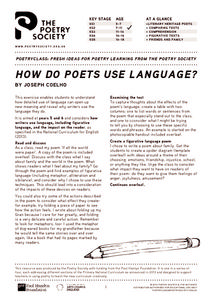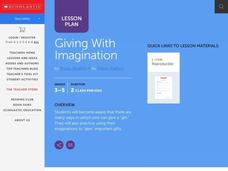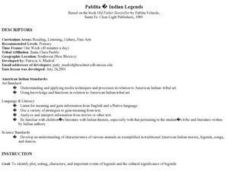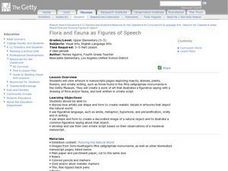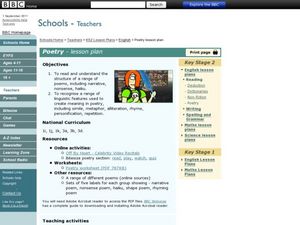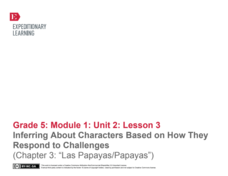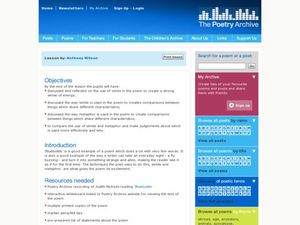Poetry Society
How do Poets Use Language?
Why do writers choose the language they do? Here's a resource that has the poet himself answer that very question. Joseph Coelho explains why he chose the words and images he used in his poem, "If All the World Were Paper."
Curated OER
Wonderful Wetlands
Fifth graders describe a wetland habitat and its components. They provide, in writing, at least one example of a wetland food chain, relate wetlands to ecological functions, and relate the importance of wetland functions to their own...
Curated OER
Tell a Ton of Tall Tales
Elementary schoolers read many tall tales. They create their own tall tale about a specific event of their choosing. They must act the part of the author. This well-designed lesson takes three class sessions to complete, and is...
Curated OER
Selfless Service and The Giving Tree - Building Ethical Conscience
Upper elementary schoolers investigate philanthropy and selflessness by reading a children's book. In this ethics lesson, they read The Giving Tree by Shel Silverstein, and research Mahatma Gandhi's troublesome, yet inspiring, life....
Curated OER
Julie of the Wolves
Have your class practice their comprehension skills using this resource. After reading Julie of the Wolves by Jean Craighead George, learners engage in cause and effect activities, identify story elements and figurative language, and...
Curated OER
Reading the Play
Do figures of speech enhance a play or story? In small groups, learners locate and describe figures of speech they find while reading a reader's theater play. After making predictions, they describe how the figures of speech make the...
California Academy of Science
Banishing Bycatch
Bycatch is a sad reality for many sea turtles, dolphins, and sharks; it occurs when they get unintentionally caught in commercial fishing nets. The class plays a game using popcorn and crackers, each child will attempt to catch the...
Roald Dahl
The Twits - Dirty Beards
The problem with beards is that they collect a lot of food. The first lesson in an 11-part unit related to The Twits by Roald Dahl explores the hairy jungle that is Mr. Twit's beard. A concluding project has learners create their own...
Curated OER
Giving with Imagination
Demonstrate gift giving as an act of caring about someone versus gifts for show (or gifts from the purse). Elementary learners practice giving gifts from the heart by creating a poem for someone special to them.
Curated OER
Pablita Indian Legends
Scholars are introduced to the characteristics of a legend. They read and discuss Old Father Story Teller by Pablita Velarde. Then, in groups, they write and illustrate a poem based on one of the legends from the book. This lesson plan...
Curated OER
Flora and Fauna as Figures of Speech
What a lovely way to incorporate artwork into your language arts lesson. View artwork in illustrated manuscript pages, depicting insects, animals, plants, flowers, and ornate writing in the Getty Museum. Practice using figurative...
Curated OER
Different Types of Poetry
Provide pupils samples of different types of poems including haikus, narrative, nonsense, shape, and rhyming poems. In groups, class members read the poems, establish their general meaning, identify poetic devices, and rate the poems,...
Gwinnett County Public Schools
Analysis of the Tuck Everlasting and The Birchbark House Text Exemplars
Looking to introduce some text-based questions into your ELA lessons? Practice the kinds of skills the Common Core demands with the seven text-based questions and the essay prompt provided here. Designed to be a three-day lesson, day one...
EngageNY
Building Background Knowledge: Learning About the Historical and Geographical Setting of Esperanza Rising (Chapter 1: “Aguascalientes, Mexico, 1924”)
Set up your class to read Esperanza Rising, by Pam Muñoz Ryan, through a class read-aloud and exploration of the setting. The detailed instructional activity outlines each step. First, class members read over the first few pages and...
EngageNY
Getting to Know Esperanza (Chapter 2: “Las Uvas/Grapes”)
Delve into Esperanza Rising by Pam Muñoz Ryan with close reading and evidence-based, text-dependent questions. Part of a unit series, this well-sequenced, Common Core designed instructional activity draws on material from the previous...
EngageNY
Inferring About Characters Based on How They Respond to Challenges (Chapter 4: "Los Higos/Figs")
How do you know what a character's personality is like if an author doesn't tell you? With a focus on character development in Esperanza Rising, pupils complete a jigsaw activity to analyze the actions of Mama, Abuelita, and Miguel. Once...
EngageNY
Inferring About Characters Based on How They Respond to Challenges (Chapter 3: "Las Papayas/Papayas")
Start off your day with a quick reading comprehension quiz about chapter three of Esperanza Rising by Pam Muñoz Ryan. After they complete the quiz, pupils participate in a discussion and look closely at the text. A strong Common Core...
EngageNY
Gathering Evidence and Drafting a Two-Voice Poem (Chapter 13: "Los Duraznos/Peaches")
Begin class with a short comprehension quiz and review and then move into a new genre: two-voice poems. The activity provides information about this type of poetry as well as a video example made by eighth graders that you can show your...
Curated OER
Marvellous Mosaics
Introduce your class to the beauty found in Muslim mosques by engaging them in a culturally inspired mosaic art project. They view and discuss the nature of the mosaics found in mosques and then they use scraps of colored paper and black...
Curated OER
Poetry Passport
Passport photos are notoriously unflattering but here's an activity that encourages youngsters to create a poetic picture of themselves using each category on the passport as a prompt for a poem.
Anti-Defamation League
Martin Luther King, Jr. and Civil Rights
How far have we come and how far do we still need to go to achieve equality and full civil rights in the United States? Include a packet of materials collected in your observance of Martin Luther King, Jr. Day.
Roald Dahl
The Twits - The Twits Get the Shrinks
Turn readers into investigative journalists. The 11th and final lesson that accompanies The Twits by Roald Dahl asks the question "What happened to Mr. and Mrs. Twit?" The lesson uses mind maps and group discussion to help answer the...
Curated OER
Bluebottle
Young scholars read the poem Bluebottle and discuss the use of the simile in the poem. In this Bluebottle poetry lesson, students analyze the use of verbs and the energy created by that use. Young scholars text mark all the similes in...
Curated OER
Simile Stories
Fourth graders view song lyrics and identify similes in the song text. In this similes lesson, 4th graders define and identify similes on a worksheet. Students write their own similes using various adjectives.
Other popular searches
- Similes and Metaphors
- Metaphors in Music Lyrics
- Examples of Metaphors
- Simile and Metaphors
- Similies and Metaphors
- Poetry Similes and Metaphors
- Similes Metaphors
- Personal Metaphors
- Similes Metaphors Powerpoint
- Metaphors Rap Music
- Winter Simile and Metaphors
- Color Poems Using Metaphors


